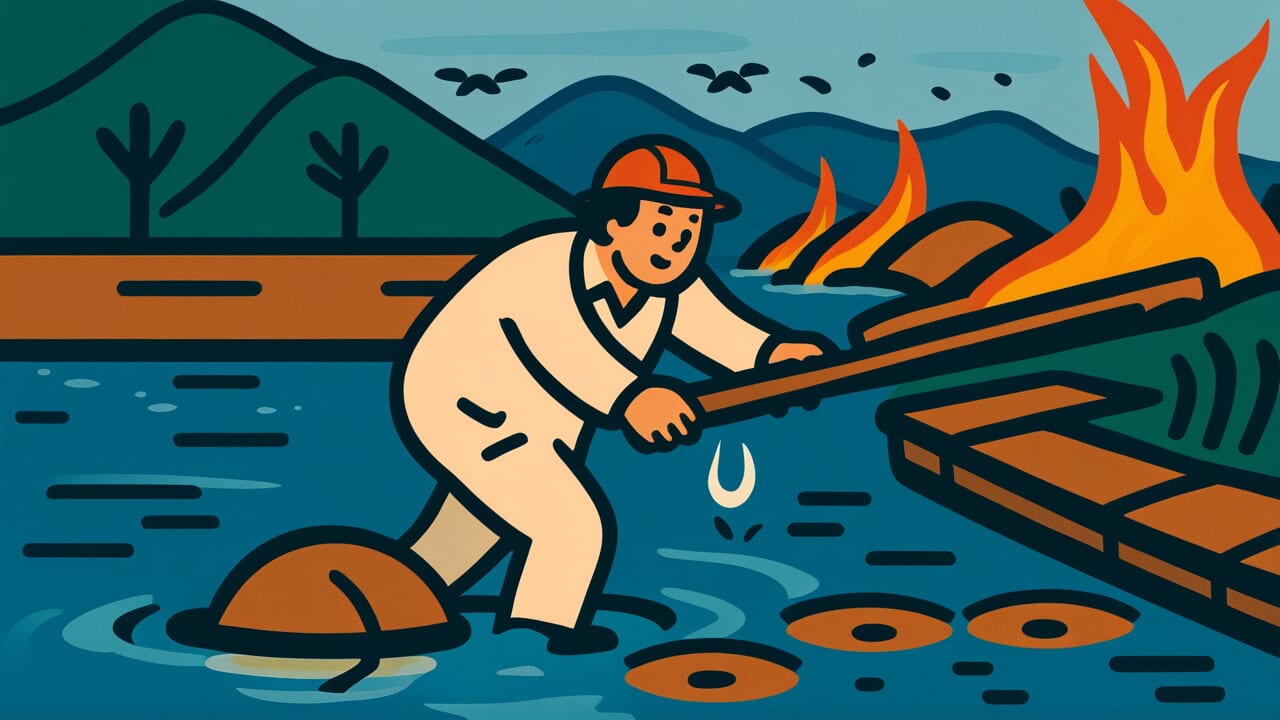How to Read “Losing fire and digging a pond”
Hi wo ushinaite ike wo ugatsu
Meaning of “Losing fire and digging a pond”
This proverb warns against the foolishness of rushing to take action only after disaster strikes. It teaches that preparation beforehand is what truly matters.
Just as it’s too late to start digging a pond for firefighting after a fire has already broken out, trying to deal with problems after they occur often means it’s already too late.
This saying is used when someone who neglected preparation faces difficulty, or when emphasizing the importance of preventive measures.
It applies to situations like cramming for an exam at the last minute, realizing health matters only after getting sick, or gathering disaster supplies only after a disaster hits.
Even today, this teaching holds unchanging value. It’s often discussed using terms like risk management or crisis management, but the essence remains the same.
Strengthening preparations during peaceful times and getting ready for foreseeable problems is the only way to minimize damage when trouble strikes.
Origin and Etymology
The exact source of this proverb is unclear, but its structure offers interesting insights.
“Losing fire” refers to letting the fire source die out, something essential to human life since ancient times. Starting fire once required tremendous effort, and once extinguished, obtaining fire again was not easy.
Therefore, constantly managing the fire to keep it alive was a basic part of daily life.
Meanwhile, “digging a pond” means excavating a pond to store water. It’s thought to express the scene of frantically starting to dig a firefighting pond after a fire has broken out.
Even if you dig a pond while fire spreads, it takes time for water to accumulate, and you’ll never make it in time.
This contrast is said to reflect the influence of teachings from classical Chinese thought that emphasize the importance of prevention.
The value of preparing before disaster strikes has been repeatedly emphasized in Eastern philosophy. By combining fire, a difficult-to-control force, with a pond, a time-consuming preparation, the expression impressively conveys how vital advance preparation is.
Using concrete imagery rooted in daily life shows the ingenuity of making lessons easy to understand.
Usage Examples
- Let’s stock up on supplies now for earthquake preparedness, so it doesn’t become like losing fire and digging a pond
- Skipping health checkups and then panicking when illness progresses is exactly like losing fire and digging a pond
Universal Wisdom
Humans have a curious trait. When crisis isn’t immediately looming, we tend to put off preparation.
This proverb has been passed down for so long precisely because it strikes at this essential human nature.
Why do we neglect preparation? Because when disaster hasn’t yet occurred, we can’t truly feel its terror.
Maintaining a sense of danger through imagination alone is extremely difficult for humans. In peaceful daily life, the effort of preparing seems wasteful.
Optimism that nothing will happen today or tomorrow dominates our hearts.
But when disaster actually strikes, people finally understand its horror and panic. Then they regret, “Why didn’t I prepare back then?”
This feeling of regret never changes, across all times and places.
Our ancestors deeply understood this human weakness. That’s why they used concrete imagery everyone could grasp—fire and pond—to convey the importance of preparation.
This proverb contains warm wisdom that, while seeing through human nature, still tries to encourage us toward wise choices.
It continues teaching the truth that true wisdom lies in the unglamorous act of preparing during peaceful times.
When AI Hears This
Digging a pond after fire goes out won’t produce water. This obvious fact actually connects directly to an absolute law governing the universe.
That’s the second law of thermodynamics—the law of entropy increase.
Looking at fire from a physics perspective, it’s a state where fuel’s chemical energy converts into “usable forms” of energy like heat and light—a low-entropy state.
But the moment fire goes out, this energy disperses into surroundings. Heat scatters into the air and can never be gathered again.
It’s like spilled water from a cup—no matter how hard you try, you can’t completely return it to the original cup.
Entropy only proceeds in the direction of increase. This is also a matter of probability.
Patterns of scattered states are astronomically numerous, but patterns of ordered states are extremely few. So the probability of order naturally returning is essentially zero.
The essence of this proverb lies in “once you miss the timing, the same effort can’t recover it.” Preparing water while fire exists is easy, but digging a pond after it’s out requires many times more effort, and the fire itself never returns.
Proactive response and reactive response differ in required energy at the physical law level. The cost difference between prevention and treatment can also be explained by this irreversibility.
Lessons for Today
What this proverb teaches you today is this truth: “Today’s small actions create tomorrow’s great peace of mind.”
Our daily lives are a continuous series of countless choices. Get a health checkup or postpone it? Save money or spend it all? Polish your skills or stay satisfied with the status quo?
None of these choices produce immediate results. That’s exactly why we tend to put them off.
But think about it. If you use just a little time today to prepare, how much will your future self be saved?
Data backups, maintaining relationships, accumulating knowledge, preserving physical strength. These are all “digging a pond” tasks that can only be done during peaceful times.
What matters is not aiming for perfection. Little by little is fine. Stack up small preparations you can do today, one by one.
That accumulation becomes the shield protecting you when trouble comes.
No one can predict the future. But you can prepare for it.
Your small actions today become the strength supporting tomorrow’s you. Believing that, why not start with what you can do?



Comments